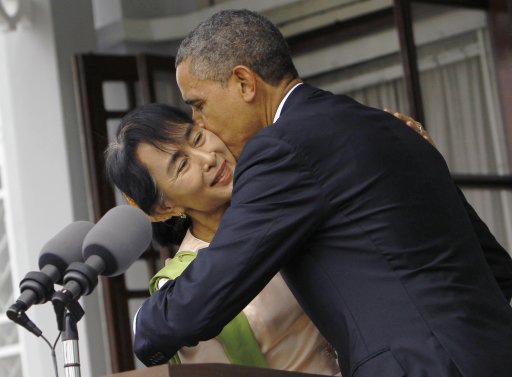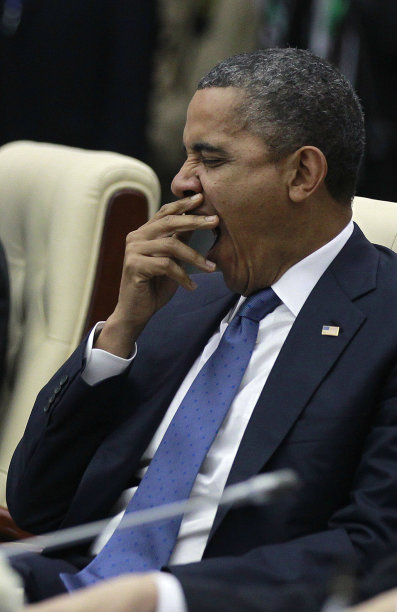=======================================
The sophisticated underground rocket launcher system in Gaza has been exposed by the terrorist organization in a video it released Saturday.
====================================
In Burma, he called the
country by what the generals used to call it, he badly mauled and
miss-pronounced the name of leader of their democracy movement. Add to that, he
kissed this single woman, which in their culture is an insult.....He gave credit
to himself for the democracy movement there (the credit should go to the Bush
administration and Laura Bush in particular ) and some are praising him, and
fawning over this trip ! Oh , please...


Image Credit & Copyright: Alex Cherney (Terrastro, TWAN)
Explanation: A dark Sun hung over
Queensland, Australia on Wednesday morning during a much anticipated total solar
eclipse. Storm clouds threatened to spoil the view along the northern coast,
but minutes before totality the clouds parted. Streaming past the Moon's edge,
the last direct rays of sunlight produced a gorgeous diamond ring effect in this
scene from Ellis Beach between Cairns and Port Douglas. Winking out in a moment,
the diamond didn't last forever though. The area was plunged
into darkness for nearly 2 minutes as the Moon's shadow swept off
shore toward Australia's Great Barrier
Reef and out into the southern Pacific. Ranging from 1/4000 to 1/15 seconds
long, five separate exposures were blended in the image to create a presentation
similar to the breathtaking visual
experience of the eclipse.
=======================================
Amateurish Hamas Propaganda Uses
Easily Disproven Photo of 'IDF Soldier' w Boot On Palestinian
Child
Reaganite Republican ^ | 18 November 2012 | Reaganite Republican
Reaganite Republican ^ | 18 November 2012 | Reaganite Republican
How dumb do they think you
are?
=======================================
A picture you will never see…
…on BBC or CNN. Found on Twitter’s #Gaza hashtag, the photo below of “Isareli
soldiers helping Palestinian kids escape the rockets from Gaza.”
Found on the IDF Twitter
feed, the video below depicts life in southern Israel under fire of the
rockets that have rained down from Gaza: “Over the past 12 years, the residents
of southern Israel have suffered over 12,000 rockets fired at them from the Gaza
Strip. This is what their life has looked like over the years.” I think it’s
safe to say you won’t be seeing this brief video compilation on the BCC or CNN
either.
=======================================

Iran must be President Obama’s immediate priority
By Henry A. Kissinger,
Henry A. Kissinger was secretary of state from 1973 to 1977.
In the aftermath of an exhausting reelection campaign, the most urgent
decision facing the president is how to stop Iran from pursuing a military
nuclear program. Presidents of both parties have long declared that “no option
is off the table” in securing this goal. In the third presidential debate, the
candidates agreed that this was a matter of the American national interest, even
as they described the objective alternately as preventing an Iranian “nuclear
weapon” or “breakout capacity” (President Obama), or a “nuclear-capable Iran”
(Mitt Romney). As Iran continues to elaborate its enrichment capacity and move
it underground, Israeli Prime Minister Benjamin Netanyahu has announced a spring
deadline for counteraction. In this fraught environment, what operational
meaning should be given to America’s declared objectives?
The United States and Iran are apparently conducting bilateral negotiations
through official or semiofficial emissaries — a departure from the previous
procedure of multilateral talks. Negotiations over Iran’s nuclear program do not
have an encouraging record. For more than a decade, Iran has stalled, first with
the “EU-3” (France, Germany and Britain) and then with the “P5+1” (the members
of the U.N. Security Council plus Germany). It has alternated hints of
flexibility with periods of intransigence, all while expanding, concealing and
dispersing its nuclear facilities. If no limit is placed on this process, Iran’s
technological progress will dominate events. But at what stage, and in what
manner, should Iran be deprived of a military nuclear capability? This has been
the essence of the argument over “red lines.”
Three stages are involved in the evolution of a military nuclear
capability: a delivery system, a capacity to enrich uranium and the production
of nuclear warheads. Iran has been augmenting the range and number of its
missile systems since at least 2006. Its enrichment capacity — long
underreported to the International Atomic Energy Agency — has been expanded to
thousands of centrifuges (the instruments that enrich uranium to bomb-grade
material). The level exceeds any reasonable definition of peaceful uses
authorized by the Non-Proliferation Treaty. The inevitable culmination is a
nuclear weapon.
To draw the line at proscribing an Iranian nuclear weapon — as some argue —
would prove unmanageable. Once the requisite amount of fissile material has been
produced, constructing and equipping a warhead is a relatively short and
technologically straightforward process, almost certainly impossible to detect
in a timely fashion.
If so ineffectual a red line were to emerge from a decade of diplomacy by
the permanent members of the Security Council, the result would be an
essentially uncontrollable military nuclear proliferation throughout a region
roiled by revolution and sectarian blood-feuds. Iran would thereby achieve the
status of North Korea, with a military nuclear program at the very edge of going
operational. Each nation that has a nuclear option would compete to minimize the
time to its own full military nuclear capability.
Meanwhile, countries within
the reach of Iran’s military but lacking a nuclear option would be driven to
reorient their political alignment toward Tehran. The reformist tendencies in
the Arab Spring — already under severe pressure — would be submerged by this
process. The president’s vision of progress toward a global reduction of nuclear
weapons would suffer a blow, perhaps a fatal one.
Some have argued that even in the worst-case scenario, a nuclear Iran could
be deterred. Yet this ignores the immensely costly, complex and tension-ridden
realities of Cold War-era deterrence, the apocalyptic strain in the Iranian
theocracy and the near-certainty that several regional powers will go nuclear if
Iran does. Once nuclear balances are forged in conditions where tensions are no
longer purely bilateral, as in the Cold War, and in still-developing countries
whose technology to prevent accidents is rudimentary, the likelihood of some
nuclear exchange will mount dramatically.
This is why the United States has insisted on limits on Iranian enrichment
— that is, curtailing access to a weapon’s precursor elements. Abandoning the
original demand to ban all enrichment, the P5+1 has explored what
levels of production of fissile material are compatible with the peaceful uses
authorized by the Non-Proliferation Treaty. The higher the level of enrichment,
the shorter the time needed to bring about militarily applicable results.
Conventional wisdom holds that the highest practically enforceable limit is
5 percent enrichment, and then only if all fissile material beyond an agreed
amount is safeguarded outside Iran.
The time available for a diplomatic outcome shrinks in direct proportion as
the Iranian enrichment capacity grows and a military nuclear capacity
approaches. The diplomatic process must therefore be brought to a point of
decision. The P5+1 or the United States unilaterally must put forward a precise
program to curtail Iranian enrichment with specific time limits.
This does not imply a red line authorizing any country to go to war.
However respectfully the views of friends are considered, the ultimate decision
over peace or war must remain in the hands of the president. Why negotiate with
a country of such demonstrated hostility and evasiveness? Precisely because the
situation is so fraught. Diplomacy may reach an acceptable agreed outcome. Or
its failure will mobilize the American people and the world. It will clarify
either the causes of an escalating crisis, up to the level of military pressure,
or ultimate acquiescence in an Iranian nuclear program. Either outcome will
require a willingness to see it through to its ultimate implications. We cannot
afford another strategic disaster.
To the extent that Iran shows willingness to conduct itself as a
nation-state, rather than a revolutionary religious cause, and accepts
enforceable verification, elements of Iranian security concerns should be taken
seriously, including gradual easing of sanctions as strict limits on enrichment
are implemented and enforced. But time will be urgent. Tehran must be made to
understand that the alternative to an agreement is not simply a further period
of negotiation and that using negotiations to gain time will have grave
consequences. A creative diplomacy, allied to a determined strategy, may still
be able to prevent a crisis provided the United States plays a decisive role in
defining permissible outcomes.
2012 Tribune Media Services
More on this topic: A video interview with Henry Kissinger Henry A.
Kissinger: Meshing realism and idealism in the Middle East David Ignatius: An
interview with Mahmoud Ahmadinejad Charles Krauthammer: Collapse of the Cairo
Doctrine
American media yawns, and some of our own friends fawn over
him about his insulting kiss.....

=======================================
60 Second Refutation of Socialism, While Sitting at the Beach
Last week, there were several comments in Carnival of
the Capitalists that people would like to see more articles highlighting the
benefits of capitalism. This got me thinking about a conversation I had years
ago at the beach:
Hanging out at the beach one day with a distant family member, we got into a discussion about capitalism and socialism. In particular, we were arguing about whether brute labor, as socialism teaches, is the source of all wealth (which, socialism further argues, is in turn stolen by the capitalist masters). The young woman, as were most people her age, was taught mainly by the socialists who dominate college academia nowadays. I was trying to find a way to connect with her, to get her to question her assumptions, but was struggling because she really had not been taught many of the fundamental building blocks of either philosophy or economics, but rather a mish-mash of politically correct points of view that seem to substitute nowadays for both.
One of the reasons I took up writing a blog is
that I have never been as snappy or witty in real-time discussions as I would
like to be, and I generally think of the perfect comeback or argument minutes or
hours too late. I have always done better with writing, where I have time to
think. However, on this day, I had inspiration from a half-remembered story I
had heard before. I am sure I stole the following argument from someone, but to
this day I still can't remember from whom.
I picked up a handful of sand, and said "this is almost pure silicon, virtually identical to what powers a computer. Take as much labor as you want, and build me a computer with it -- the only limitation is you can only have true manual laborers - no engineers or managers or other capitalist lackeys".
Yeah, I know what you're thinking - beach sand
is not pure silicon - it is actually silicon dioxide, SiO2, but if she didn't
take any economics she certainly didn't take any chemistry or
geology.
She replied that my request was BS, that it took a lot of money to build an electronics plant, and her group of laborers didn't have any and bankers would never lend them any.
All too many defenders of capitalism would have
stopped here, and said aha! So you admit you need more than labor - you need
capital too. But Marx would not have disagreed - he would have said it was the
separation of labor and capital that was bad - only when laborers owned the
capital, rather than being slaves to the ruling class that now controls the
capital, would the world reach nirvana. So I offered her just that:
I told her - assume for our discussion that I have tons of money, and I will give you and your laborers as much as you need. The only restriction I put on it is that you may only buy raw materials - steel, land, silicon - in their crudest forms. It is up to you to assemble these raw materials, with your laborers, to build the factory and make me my computer.She thought for a few seconds, and responded "but I can't - I don't know how. I need someone to tell me how to do it"
And that is the heart of socialism's failure.
For the true source of wealth is not brute labor, or even what you might call
brute capital, but the mind. The mind creates new technologies, new products,
new business models, new productivity enhancements, in short, everything that
creates wealth. Labor or capital without a mind behind it is
useless.
Since
1700, the GDP per capita in places like the US has risen, in real terms, over 40
fold. This is a real increase in total wealth - it is not money stolen or looted
or exploited. Wealthy nations like the US didn't "take" the wealth from
somewhere else - it never even existed before. It was created by the minds of
human beings.
How? What changed? Historians who really study
this stuff would probably point to a jillion things, but in my mind two are
important:
-
There was a philosophical and intellectual change where questioning established beliefs and social patterns went from being heresy and unthinkable to being acceptable, and even in vogue. In other words, men, at first just the elite but soon everyone, were urged to use their mind rather than just relying on established beliefs
-
There were social and political changes that greatly increased the number of people capable of entrepreneurship. Before this time, the vast vast majority of people were locked into social positions that allowed them no flexibility to act on a good idea, even if they had one. By starting to create a large and free middle class, first in the Netherlands and England and then in the US, more people had the ability to use their mind to create new wealth. Whereas before, perhaps 1% or less of any population really had the freedom to truly act on their ideas, after 1700 many more people began to have this freedom.
So today's wealth, and everything that goes with it
(from shorter work hours to longer life spans) is the result of more people
using their minds more freely.
Look around the world - for any country, ask yourself if
the average person in that country has the open intellectual climate that
encourages people to think for themselves, and the open political and economic
climate that allows people to act on the insights their minds provide and to
keep the fruits of their effort. Where you can answer yes to both, you will find
wealth and growth. Where you answer no to both, you will find poverty and
misery.
==============================================================
It says it in the
Bible:
It all makes sense now. Gay marriage and marijuana being legalized on
the same day!
Leviticus 20:13 - "if a man lays with another man, he should be stoned."
We've just been interpreting it wrong all these years!!!
|
======================================

Ugly uniform of the Steelers ! WASPS?
=======================================
Ross Mirkarimi Dresses Like General Eisenhower
 |
| Luke Thomas |
| A sharp-dressed man... |
As police chief, Gascón was far more likely than not to wander into police headquarters dressed like a lawyer. Gascón is a lawyer, and Mirkarimi is not -- but, in the limited amount of time the sheriff has been permitted to do the job he was elected to do, he's often outfitted like one.
So, it was a bit jarring to see Mirkarimi clothed in full sheriff's dress regalia during the weekend's Veteran's Day March. Decked out in a forest green uniform complete with gold-starred epaulets and gold bands on an Eisenhower jacket, the progressive sheriff looks like he ought to be leaping off a Jeep and warning us about the perils of the Military-Industrial Complex.
Yet while this uniform might be a head-turner, it's actually something of a California template.
Sheriff's department spokeswoman Susan Fahey said the "Class A uniform" -- worn to inaugurations, funerals, and other high-level events -- is essentially "standardized" throughout the state.
Even the longest-serving sheriffs couldn't remember wearing anything much different, other than a sea change in 1999 or 2000 when the department pulled the trigger and made the shift from British green to forest green. Those were heady times.
Calls to the California State Sheriffs' Association querying why sheriffs' duds look like a cross between military officers and park rangers have not yet been answered.
A quick glance at the association's board of directors, however, reveals that Fahey is right -- there is a fairly standard template of sheriff's dress uniforms.
More when we know more about this most pressing situation.
=======================================
Puke !!!

=======================================
Another Puke ! ! !

=======================================











No comments:
Post a Comment